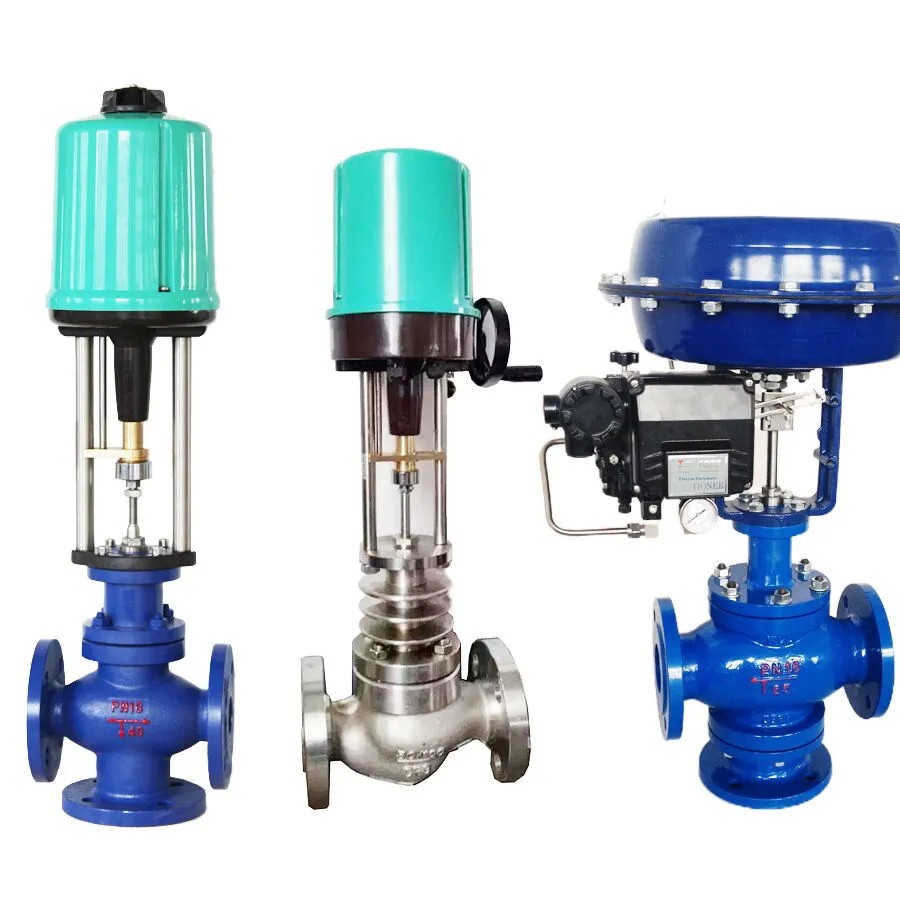Revolutionizing Fluid Control with Electric Control Valves

Strong 8k brings an ultra-HD IPTV experience to your living room and your pocket.
Unlocking Precision: The Power of Electric Flow Control Valves in Modern Industry
In today’s rapidly evolving world of industrial automation, one innovation stands out for its transformative impact on fluid management: the electric flow control valve. These smart devices blend the mechanics of traditional valve systems with the intelligence of electric actuators to deliver unmatched precision in controlling the flow of liquids, gases, and slurries.We are a leading control valve manufacturer in China, delivering high-performance valves and control actuators engineered to meet a wide range of industrial applications.
Whether fine-tuning processes in water treatment plants, managing corrosive chemicals in chemical processing, or ensuring reliable fuel delivery in power generation, electric flow control valves are reshaping industries through their accuracy, efficiency, and adaptability.
As industrial operations become increasingly digitized and sustainability-focused, electric valves are shifting from a cutting-edge option to a strategic necessity. Let’s explore how these advanced components are driving smarter, safer, and more streamlined fluid control across sectors.
Key Features of Electric Flow Control Valves
Electric flow control valves bring a combination of automation, precision, safety, and flexibility to the table. Here are the standout features that make them essential in modern industrial systems:
1. Advanced Automation Capabilities
Electric valves integrate seamlessly into automated systems and digital platforms like SCADA and PLCs. Unlike manual or pneumatic valves, they enable operators to remotely monitor and adjust valve positions, reducing the need for physical intervention and increasing operational efficiency.
This real-time control not only enhances responsiveness but also reduces errors and labor costs—crucial in environments where exact flow rates can affect safety or product quality.
2. Exceptional Precision and Control
Equipped with high-performance electric actuators and positioning systems, these valves offer micro-level adjustments that maintain consistent flow rates. This is vital in industries where tight tolerances are mandatory—such as pharmaceuticals, food processing, or electronics manufacturing—ensuring compliance with strict quality and safety regulations.
3. Broad Industrial Versatility
Electric flow control valves are designed to perform across a wide range of environments and media types. They’re deployed in:
Water and Wastewater: Automating flow in filtration, chlorination, and distribution systems.
Chemical and Petrochemical: Handling hazardous and corrosive fluids with precise control.
Oil & Gas: Operating in high-pressure environments for safe fuel and gas transport.
Power Generation: Managing steam and cooling water in demanding applications.
Manufacturing: Regulating flow in cooling circuits, hydraulics, and process lines.
Their adaptability to various pressures, temperatures, and media makes them a versatile choice for engineers worldwide.
4. Enhanced Safety and Reduced Risk
By enabling remote operation, electric valves significantly lower the risk to personnel working in hazardous conditions. Many models include built-in safety features such as overload protection, fail-safe mechanisms, and emergency shut-off options, which are critical in high-risk sectors.
5 Ways Electric Flow Control Valves Boost Operational Efficiency
In addition to core features, electric valves provide real-world advantages that drive performance, savings, and sustainability.
1. Superior Flow Regulation
With precise control over valve actuation, industries benefit from enhanced accuracy in flow management. Applications include:
Pharmaceuticals: Accurate dosing in batch mixing.
Chemical Processing: Stable flow in reactive environments.
Food & Beverage: Maintaining uniformity in product quality.
This high level of precision minimizes waste and improves overall process consistency.
2. Digital Integration and Smart Control
Electric valves are designed for compatibility with digital infrastructure, offering real-time feedback and remote control. When integrated into SCADA or DCS systems, they allow operators to:
Monitor performance continuously.
Automate complex sequences.
Quickly respond to operational changes.
This leads to better resource management, faster troubleshooting, and data-driven optimization.
3. Energy Efficiency and Sustainability
Unlike pneumatic valves that rely on constant air compression, electric valves consume power only during actuation. This significantly reduces energy usage and operational costs.
By minimizing reliance on large compressors, electric valves contribute to lower carbon emissions and help companies meet energy-saving goals or achieve sustainability certifications.
4. Durability and Reliability
Constructed with robust materials such as stainless steel or industrial-grade polymers, electric flow control valves are built to endure harsh conditions, including high pressure, extreme temperatures, and corrosive fluids.
With sealed designs and optional self-diagnostic features, they also reduce maintenance needs and support predictive maintenance strategies—leading to fewer breakdowns and extended equipment life.
5. Reduced Costs and Maximum Uptime
The combination of reliability, low maintenance requirements, and energy efficiency results in substantial cost savings over time. Electric valves help avoid unplanned downtime—especially critical in sectors where interruptions can cost thousands per hour.
By improving system availability and cutting down on service interventions, they enhance operational resilience and profitability.
The Future of Smart Valve Technology
Electric flow control valves are poised to play a central role in the Industry 4.0 era. Innovations such as embedded sensors, wireless communication, AI algorithms, and cloud-based platforms are transforming these components into intelligent assets that support predictive maintenance and autonomous optimization.
Future generations of electric valves will likely feature real-time monitoring of parameters like temperature, pressure, and vibration—feeding actionable data into centralized systems to improve plant-wide performance.
This integration of IoT, automation, and analytics cements electric valves as a foundational element in the transition to smarter, more sustainable industrial operations.
Conclusion: Pioneering the Future of Fluid Management
Electric flow control valves are more than just components—they are enablers of progress. With their unmatched control, reliability, and adaptability, they help industries meet the growing demands of performance, safety, and sustainability.
From reducing environmental impact to maximizing uptime and supporting advanced automation, electric valves are shaping the future of fluid control across the globe. As industries continue to evolve, their role will only grow—driving smarter systems, safer workplaces, and more sustainable operations.
Note: IndiBlogHub features both user-submitted and editorial content. We do not verify third-party contributions. Read our Disclaimer and Privacy Policyfor details.


